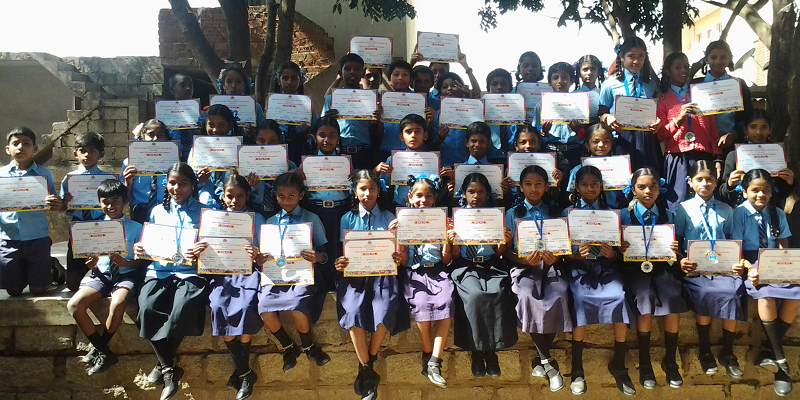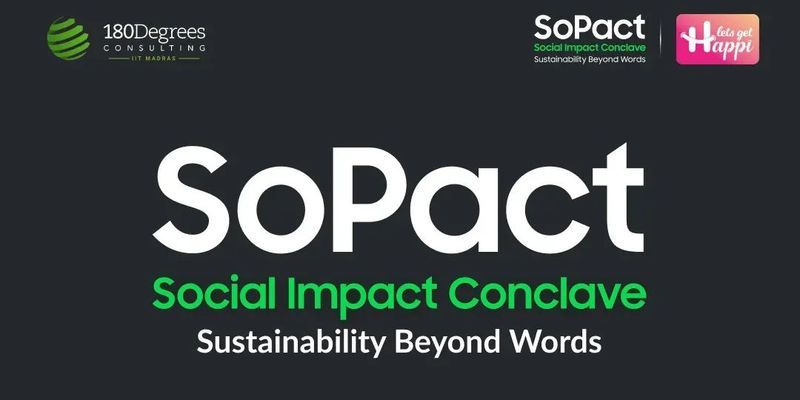The woman who asked for Rs. 200 to educate herself has helped awaken the dreams of 14,000 underprivileged children
I just needed Rs. 200 for my college education. My mother and I took a journey to Chittoor (in Andhra Pradesh) to seek help from a relative who had generously benefitted from my father’s business when it was flourishing. In the 80s, travelling from one place to another was an ordeal in itself. All I got was Rs. 50. I came out bawling and vowed to myself that I would never ask anyone for anything again. I decided that I was going to make it, all by myself.
Joy Srinivasan was 10 when her father’s business ran into financial trouble and ultimately collapsed. The people who once frequented her house had now turned away. From being able to give his children anything they asked for, her father was reduced to a situation where he couldn’t afford their school fees. Joy requested her father to help her continue her education. “It was the 70s. At that point, the girl child was not given the same status as a boy in society. But my father paid heed to what I said and kept me in school. I couldn’t go to a convent school like my friends but I went to a school”, recalls Joy.

Gauging her father’s situation, Joy was often told that she would never be able to complete school, let alone dream of college. But the incident at the relative’s place had instilled an iron will in her.

Joy started her professional career in 1988 after completing a Bachelor of Commerce degree. With a job and the ability to finance herself, Joy went on to pursue more qualifications. She is an accredited professional member of Indian Society for Applied Behavioural Science (ISABS), and a graduate of Women’s Leadership Trainer of Mayyam (India) & Wier Merrill Associates, US.
Joy says,
During this, the realisation hit me that it’s not impossible for children from poorer backgrounds like mine to achieve their dreams. Instead of being victimised, it is important to stand up and walk. With the right knowledge and awareness, the transformation is possible.
Makkala Jagriti

Alongside her flourishing career, Joy kept investing her time and money in helping underprivileged children finish their education. Her house help Chitra had been abandoned by her husband. Chitra came from a family of cobblers and had a teenage son, Mavesh, whose education she was struggling to finance. Joy understood that the teenage boy was also subject to an environment where substance abuse and violence was common. So, on certain days, Mavesh stayed at Joy’s place and studied. Mavesh pursued a Bachelor’s and then a Master’s degree in Commerce. Not only that, he went to Washington D.C. on behalf of the firm he worked for.Seeing this transformation reaffirmed Joy’s belief that the dreams of all underprivileged children can be realised. Even more people started coming to Joy asking for help. By 2003, Joy had spent about 12 years helping children. She decided that it was time to start something formal and full time. That year, she founded ‘Makkala Jagriti’, an NGO.

Makkala Jagriti focuses on the issues of right to education, holistic development education, life skills, leadership programme, and community development for marginalised children, youth and their parents. Makkala Jagriti also collaborates with government schools (urban and rural) and juvenile homes.
Awakening children’s dreams
Makkala Jagriti translates to ‘awakening of children’.
Joy started interacting with these children on a daily basis, but felt that it wasn’t enough to bring about a transformation through education. A study of the slums revealed that most children who lived here began dropping out of school by Class VII, with almost all of them giving up by Class IX. “Most children fear subjects like Math and Science, since their foundation in these subjects is obviously shaky. So interest levels plummet as they progress in school, and they begin to drop out. Another core problem is that these children have no role models inside the community to look up to. Most of them end up working as household help or some other labour-intensive job. It is a vicious cycle”, says Joy.
The answer lies in setting up learning centres near the slums. Joy set up the first holistic development model centre (HDLC) of learning in Adugodi (in Bengaluru) and the pilot saw many children between the ages six and 14, pouring in and enjoying the learning centre. Joy and the Makkala Jagriti team began interacting with the parents of these children, educating them about rearing their children better.

These centres have multi-level intervention programmes and hold classes in four major focus areas: Intellectual Development (reading programmes [Library] in Kannada and English, English star programme, Math star programme and science experiments, and computer skill programmes) and Creative Development (art, craft, painting, embroidery, drawing, theatre, dance, music, puppetry, and magic), Physical Development (taekwondo skill building, throw ball, badminton, running and other sports) and Social and Emotional Development (civic awareness, mentoring and counselling, and team-building activities).

With children enthusiastically coming to these learning centres, even after school, it spiked the interest of schoolteachers, who found it a challenge to get these children to come to school. In collaboration with Makkala Jagriti, learning centres have been set up in some government schools, where children would be given time to learn and enjoy themselves at these in-school learning centres. Such centres were also set up in rural schools (in Koppal, Karnataka) and juvenile homes. By 2012, there were 17 such centres. Today, Makkala Jagriti has seven active centres, with some old centres integrated with the schools.

Joy tells us that since its inception, Makkala Jagriti has reached out to 14,000 children, 1,000 youth, 700 parents, and 500 teachers. Joy says that what separates Makkala Jagriti from others is that they don’t just set up a centre and monitor it weekly, they’re present every day to make sure the impact is achieved.
Yuva Jagriti
The children who joined the learning centres in the early stages are now young adults and have asked for a centre where they can continue on their journey of transformation. ‘Yuva Jagriti’ was setup for the 15-25 age group in urban slums. These centres offer soft skills, livelihood skills, personality development, career counselling, and guidance sessions that help them cope with the pressures that any young adult faces.

Joy says, “We now have these young adults who have jobs and have achieved their dream. With this, we’ve solved one core problem that the community used to have – having a role model. The children from these communities finally have someone among they can look up to. The vicious cycle has been broken.”
Makkala Jagriti has taken in many willing adults from the community, who might not have had a chance at formal education, but are willing to train to contribute to the learning centres. “We teach them how to assist the facilitators at the centre, and how to manage children. Some of these people who were making Rs. 2,500 a month as wages or by doing household work have now gone to organisations that are paying them up to Rs. 17,000”, says Joy.
Finding her joy
With 25 years of her life dedicated to making a difference, Joy has had challenging days, especially with recognition in this sector coming slow. “Surprisingly, I’ve never wanted recognition. When you’re working for your passion, you don’t want a reward. For me, children becoming role models in their communities is all the reward.”

On a parting note, Joy shares a little bit from her own story entwined with the children and youth,
I was one of the few girls in my family to get educated. When I look back, I see that I’m the same girl, who once struggled to finish her education. Every success story is a reminder of how another child like I was once has found his/her dream. The possibilities for these children are endless and I will never leave any stone unturned to transform these children’s lives and make their dreams come true.











